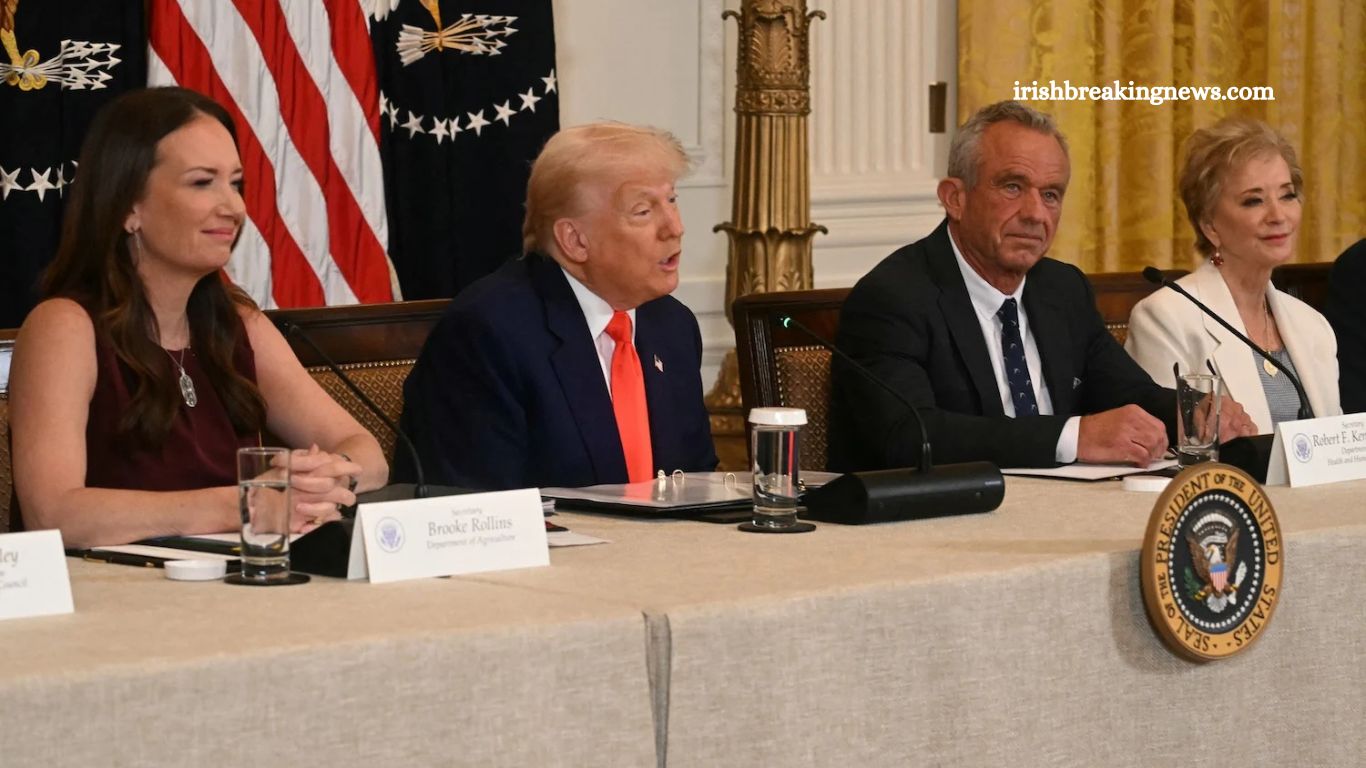Washington, D.C. — The Make America Healthy Again (MAHA) commission, launched by President Donald Trump through an executive order on February 13, released its first official report on Thursday titled “Make Our Children Healthy Again: Assessment.” The report was unveiled during a White House event featuring President Trump and Robert F. Kennedy Jr., Secretary of Health and Human Services.
Read More: Ultimate School Supplies Checklist: Essentials Every Student Needs
Overview of the Report
The 68-page document offers a broad assessment of the health challenges facing American children today. It combines well-founded observations about nutrition and the role of large food corporations with more controversial claims regarding the causes of poor health in the United States.
The report begins with a stark warning: “The health of American children is in crisis.” Despite spending more than double per capita on healthcare compared to peer nations, the United States ranks last in life expectancy among wealthy countries, while experiencing high rates of obesity, heart disease, and diabetes.
Key Findings and Claims
The report identifies four main factors contributing to the poor health of American children:
- Poor diet
- Lack of physical activity and chronic stress
- Overmedicalization
- Exposure to environmental chemicals
It also raises concerns about technology’s impact and indirectly suggests that vaccines might be contributing to childhood illnesses, without explicitly claiming vaccines cause autism—a claim long disproven by scientific research.
Vaccine Controversy and Autism Concerns
President Trump reiterated his concern over rising autism rates, stating at the event, “Just a few decades ago, one in 10,000 children had autism. Today it’s one in 31.” He emphasized this alarming increase as a key motivation for the commission’s work.
The report controversially points to Europe’s lower vaccine requirements as a factor in its longer life expectancy compared to the U.S., neglecting to address ongoing measles outbreaks and the role of universal healthcare systems in European health outcomes.
Environmental and Chemical Exposures
The MAHA report raises alarms about pesticides such as glyphosate and atrazine, microplastics, fluoride, and even links cellphone and Wi-Fi radiation to declining sperm counts—an unproven hypothesis lacking strong scientific support.
Composition of the MAHA Commission
The White House event showcased the commission’s members, a group largely aligned with President Trump’s views, including:
- Robert F. Kennedy Jr., a known anti-vaccine advocate
- FDA Commissioner Marty Makary
- Education Secretary Linda McMahon
- OMB Director Russ Vought
- EPA head Lee Zeldin
- Adviser Stephen Miller
- Medicare and Medicaid chief Mehmet Oz
Agriculture Secretary Brooke Rollins, criticized for cutting approximately $1 billion in USDA funding to food assistance programs, also serves on the commission.
Behind-the-Scenes and Report Adjustments
According to reports, the commission met only once behind closed doors prior to the report’s release. The White House reportedly requested last-minute edits, including removal of references to corporate lobbying on “forever chemicals.” Additionally, some recognition was added regarding vaccines’ role in preventing infectious diseases, likely to temper the report’s anti-vaccine messaging.
The Environmental Protection Agency, under Zeldin’s leadership, is expected to relax regulations on these chemicals, despite their potential health risks.
Broader Context and Criticism
While the U.S. undeniably struggles with poor health outcomes and lower life expectancy compared to other wealthy nations, the MAHA commission’s approach has been criticized for blending legitimate health concerns with anti-scientific theories and spiritual rhetoric. Secretary Kennedy has described MAHA as having a strong spiritual dimension, echoed by some of the commission’s nominees.
Frequently Asked Questions
What is the MAHA Commission?
The Make America Healthy Again (MAHA) Commission is a presidential advisory group established by President Donald Trump via executive order on February 13. It aims to assess and recommend solutions to improve public health in the United States, particularly among children.
Who leads the MAHA Commission?
The commission is headed by Robert F. Kennedy Jr., who also serves as Secretary of Health and Human Services. He is a controversial figure due to his outspoken views on vaccines and environmental issues.
What is the title of the commission’s first report?
The first report is titled “Make Our Children Healthy Again: Assessment.” It is a 68-page document released during a White House event on May 23, 2025.
Does the report say vaccines cause autism?
No, the report does not explicitly claim that vaccines cause autism. However, it subtly raises concerns often associated with vaccine skepticism. These implications are controversial and not supported by mainstream scientific consensus, which has repeatedly confirmed that vaccines do not cause autism.
Was the report peer-reviewed or made public in full?
As of its release, the report had not been peer-reviewed and was not officially published on WhiteHouse.gov. Reports suggest last-minute edits were made by the White House, including the softening of some anti-vaccine language and removal of corporate lobbying references.
What has the response been from the scientific community?
Public health experts and scientists have expressed concern over the mixing of legitimate health issues with pseudoscientific and politicized claims. Critics warn this could undermine trust in public health policy and shift attention away from evidence-based solutions.
What comes next?
The MAHA Commission is expected to release a second report in August 2025 outlining policy strategies. Secretary Kennedy has controversially claimed it will include a definitive explanation for the rise in autism—something scientists caution is not how medical discovery works.
Conclusion
The release of the MAHA Commission’s first report marks an ambitious, yet highly controversial, effort to address the health crisis affecting American children. While the report highlights some pressing issues such as poor nutrition, chronic disease, and environmental exposures, it also ventures into disputed territory by suggesting vaccine-related concerns and other unproven theories.
The commission’s composition and the report’s editorial changes have raised questions about the influence of politics and ideology over scientific rigor. As the U.S. continues to face significant public health challenges, the success of the MAHA initiative will depend largely on its ability to ground future policy recommendations in credible, evidence-based science.

